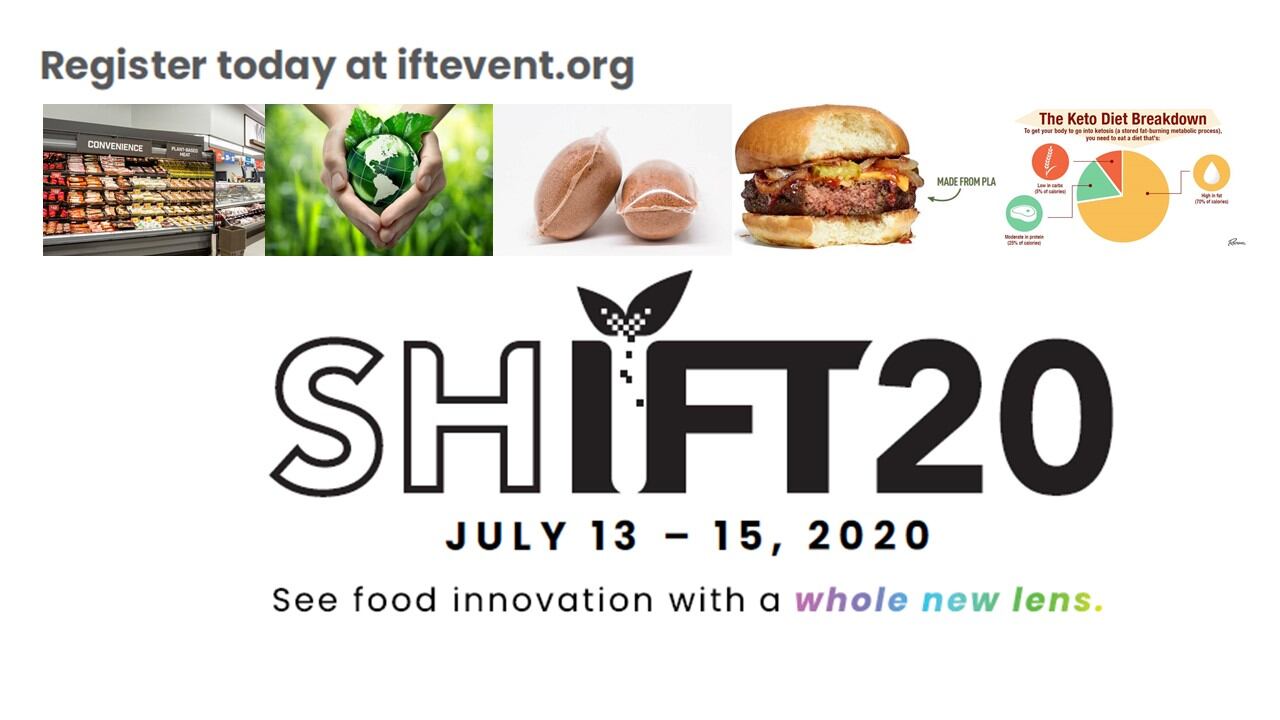The education program is split into two components:
1) Scheduled events will be broadcast in real time on July 13, 14 and 15. Here, registered attendees will be able to tune into live presentations and panel debates (which will subsequently be made available on demand).
2) Scientific sessions have been pre-recorded, and will be available to watch on demand when the show opens on July 13. They will remain available for up to a year for attendees to watch at their convenience.
You can download the brochure listing ALL the sessions and find out more about the networking and social events HERE, but here are some of the sessions that caught our eye …
LIVE SESSIONS (SCHEDULED EVENTS, JULY 13-15)
July 13, 1-2pm CT: Our Food System is Killing Our Earth – What are We Going to Do About it?
The mass cultivation and production of food have tremendous impacts on the health of our planet. How can we best balance consumer wants and business needs while protecting the future of our planet? This panel will discuss this important topic and challenge participants to explore new and innovative solutions through a live Q&A session.
July 14, 9.30-10.30am CT: Stop Wasting Waste – Upcycling Our Future
Technology makes it possible to track, trace, and transform our trash into things we need. This panel and supporting sessions will focus on new ways of preventing waste, and upcycling ingredients and packaging to make our food system more sustainable.
July 14, 4-5pm CT: The Future of Food Safety with Frank Yiannas, FDA Deputy Commissioner for Food Policy and Response
In this session, Frank Yiannas, FDA Deputy Commissioner for Food Policy and Response will discuss the cross-section of data science and emerging technologies shaping the future of food safety and how they can deliver benefits for all across the food supply chain. The Deputy Commissioner will participate in Q&A session following the discussion.
July 15, 2-5pm CT: Hacking Millennial and Gen Z Tastes
How do you address generational differences and demands in the shifting consumer base? Join us for an exciting, virtual product development hackathon informed by the work of Eve Turow-Paul, the author of A Taste of Generation Yum and the go-to expert on the high-value realm of millennials and food.
SCIENTIFIC SESSIONS (ON DEMAND)
How Will Artificial Intelligence Impact a Food Technologist’s Role?
Artificial intelligence (AI) solutions can play a pivotal role in significantly improving the success of new and seasonal products. AI can be used to analyze these data points and provide direction for new product development and the go-to-market strategy for product launches. Buying behaviors and customer sentiments help identify common characteristics of products that have succeeded versus those that have failed. And, depending on the access to outside data, competitive and emerging market intelligence could even be leveraged to help gain market leadership. Join this session to understand how AI could change the way food technologists ideate and partner with their marketing team to innovate, grow market share, and increase customer loyalty.
Food and Nutrition Innovation Through Synthetic Biology
In this session, four speakers who have been involved in developing and facilitating synthetic biological innovations in food and nutrition will give presentations including an overview of synthetic biological approaches in food innovation, microbial metabolic engineering to produce food ingredients, plant genome engineering to minimize anti-nutritional metabolites, and venture capital funding to foster startup companies seeking synthetic biological innovations. After these presentations, a panel discussion to explore potential limitations and solutions will be facilitated.
Going Keto: Discovering the What, the Who, and the How of the Keto Friendly Diet
The session will start by offering a registered dietitian’s nutrition perspective on the keto diet. The keto diet has been used to manage a range of medical conditions, and more recently it has gained attention as a popular diet. The next section will review the latest in consumer and product trends for this lifestyle diet with legs. With consumers seeking more personalized solutions for their nutrition needs, lifestyle diets such as keto present an interesting opportunity for the industry. The final segments will provide strategies, tools and tips relative to fats, proteins and sugar replacers that are key to achieving great tasting products in keeping with requirements of this dietary regimen. Reformulating products to meet keto dietary guidelines can pose numerous challenges for the food scientist.
What’s in a Name? The Rules and Regulations Surrounding Labeling Foods
In the news today, we hear about such products as lab-based meat and dairy, plant-based burgers that bleed, insect pasta, algae, super mushrooms, and a host of dairy products that are made from non-traditional sources. Consumers are pressuring the industry to deliver ‘transparent’ labels, and purposeful claims impacting their own human health. Truthful and non-misleading labels are important to the consumers and industry, but this has not come without some pushback on the language that is required for certain claims and product standards. Experts will discuss current technologies and how they fit into the current labeling regulatory scheme; current challenges to standards of identity; and the issues of how competitors may challenge your product and your labeling; and why the public perception may be both your friend and your enemy.
Plant-Based Protein: A Marketing Dilemma
Using data generated from several surveys, including a recent 2018 survey of Canadians, the market trends for consumer beliefs and purchase intent when it comes to meat consumption versus plant-based protein consumption will be shared. Additionally, market trends from an industry perspective will be evaluated. Furthermore, speakers will discuss the challenges in marketing plant-based protein versus animal-based protein, and the substantiation requirements and qualifying criteria for the various claim categories. Finally, litigation related to plant-based protein will be reviewed in an effort to elucidate the current challenges in marketing plant-based protein and how to minimize risk.
Protein Production, Consumption and Sustainability: Consumer, Academic and Industry Insights
The way consumers are buying and consuming their protein from both plant-based and animal resources is quickly evolving. While the industry looks to meet consumer demand for more protein sources, there is also the call for more sustainable food production practices. In this session, we will explore consumer data about perceptions on environmentally sustainable and healthy diets, take a closer look at food production matching up with consumer demand.
Swimming Toward a Better Future: The Current Landscape of Plant-Based and Cultivated Seafood Innovation
Seafood is generally recognized as a healthy protein source and is a dietary staple in many parts of the world. However, both commercial fishing and aquaculture have environmental and animal welfare challenges. These concerns necessitate a change in how we produce seafood. Scientists in academia and industry are investigating new approaches such as plant-based and cultivated seafood. In this panel, we will hear from leaders in cultivated seafood as well as in industrial food service and sustainable aquaculture.
Single Use Plastic Packaging for Food and Beverages: Challenges and Opportunities to Achieve Sustainability
This session will provide insight on the value chain of recycling single use plastic packaging, including topics on use of recycled plastic material for food packaging, design of packaging to ease recyclability, and efforts to expand and promote plastic recycling industry through
improvements to supply, demand, and quality.
Designed to Disappear: The Future of Sustainable Food and Beverage Packaging
How to deliver single serving and on-the-go convenience consumers crave without creating a pile of packaging? Biomimetics may hold the answer. How does nature do single serving? With biodegradable or edible wrappers. Bananas, oranges, nuts, all these foods come prepackaged in protected single servings for our convenience. Due to the film’s water-solubility, it’s an ideal packaging substrate for products consumers add to liquids. Beverage powders, oatmeal packets, instant coffee, and flavor additives are just some examples of this application. PVOH has the capability to synergize the conflicting trends of convenience and sustainability in the food and beverage industries.
2025, the Third Wave of Plant-Based Eating: What to Expect, What Consumers Want, and How the First, Second, and Third Wave Ingredient Enablers and Brands Will Respond
Over the last decade the plant-based sector has transitioned from niche to mainstream, showing a staggering growth of over 30% in the last two years. This session will reference proprietary Mattson consumer data to articulate the motivation for initial trial, repeat purchase, frequency of purchase, and attributes that drive liking. The data will show the differences between omnivores, flexitarians, vegetarians, vegans, and early adopters in this product space. Mattson predicts that the plant-based space will soon see a Third Wave of evolution, similar to the evolution of coffee driven by transparency and cleaner product labels. In this symposium, we will use this data to predict what this evolution will entail and hear from brands their pathways and solutions towards the next generation of products.
Impact of Diet-Microbiota Interactions on Human Health
In this session we will evaluate the interactions between dietary compounds and the gut microbial community and its potential significant impact on human health. We’ll also discuss the importance of understanding this interaction for further develop nutraceuticals and functional foods.
Protein Hybrid Products (Meat Hybrids): A Sustainable Transition to Flexitarianism?
Meat is strongly integrated in our diet, everyday habits and cultural traditions: 51% of US consumers don’t consider a meal without meat a full meal and 2/3 of Americans think that meat is an essential part of a balanced diet. Protein hybrid products could be a viable alternative bringing meat taste and satisfaction to the consumer along with the benefits of alternative proteins (predominately derived from plants but also from insects). The session aims to respond to the growing demand for protein hybrid products.
Download the brochure listing ALL the sessions…


